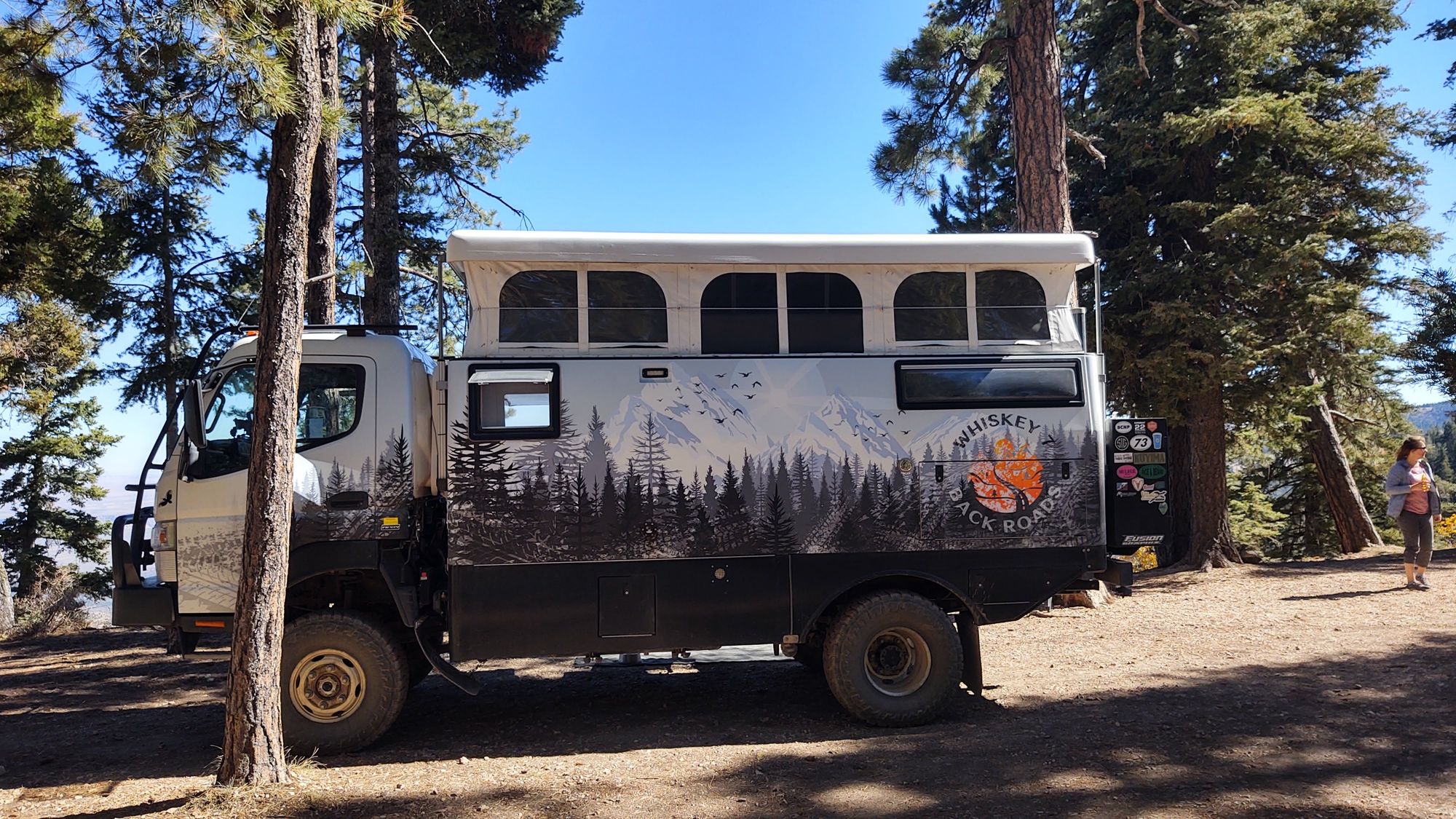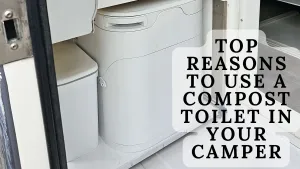Have you ever considered using a composting toilet for your camper? We've discovered that these innovative systems are revolutionizing the way we approach waste management in recreational vehicles. As avid campers ourselves, we've found that composting toilets offer a range of benefits that can greatly enhance our camping experiences.
In this article, we'll explore the top reasons to use a composting toilet for your camper. We'll delve into the environmental advantages, the space and weight savings they provide, and how they enable off-grid camping freedom. Additionally, we'll discuss the odor control and hygiene benefits that make composting toilets a game-changer for camper van enthusiasts. By the end, you'll have a clear understanding of why replacing your RV toilet with a composting toilet might be the best decision for your camping adventures.
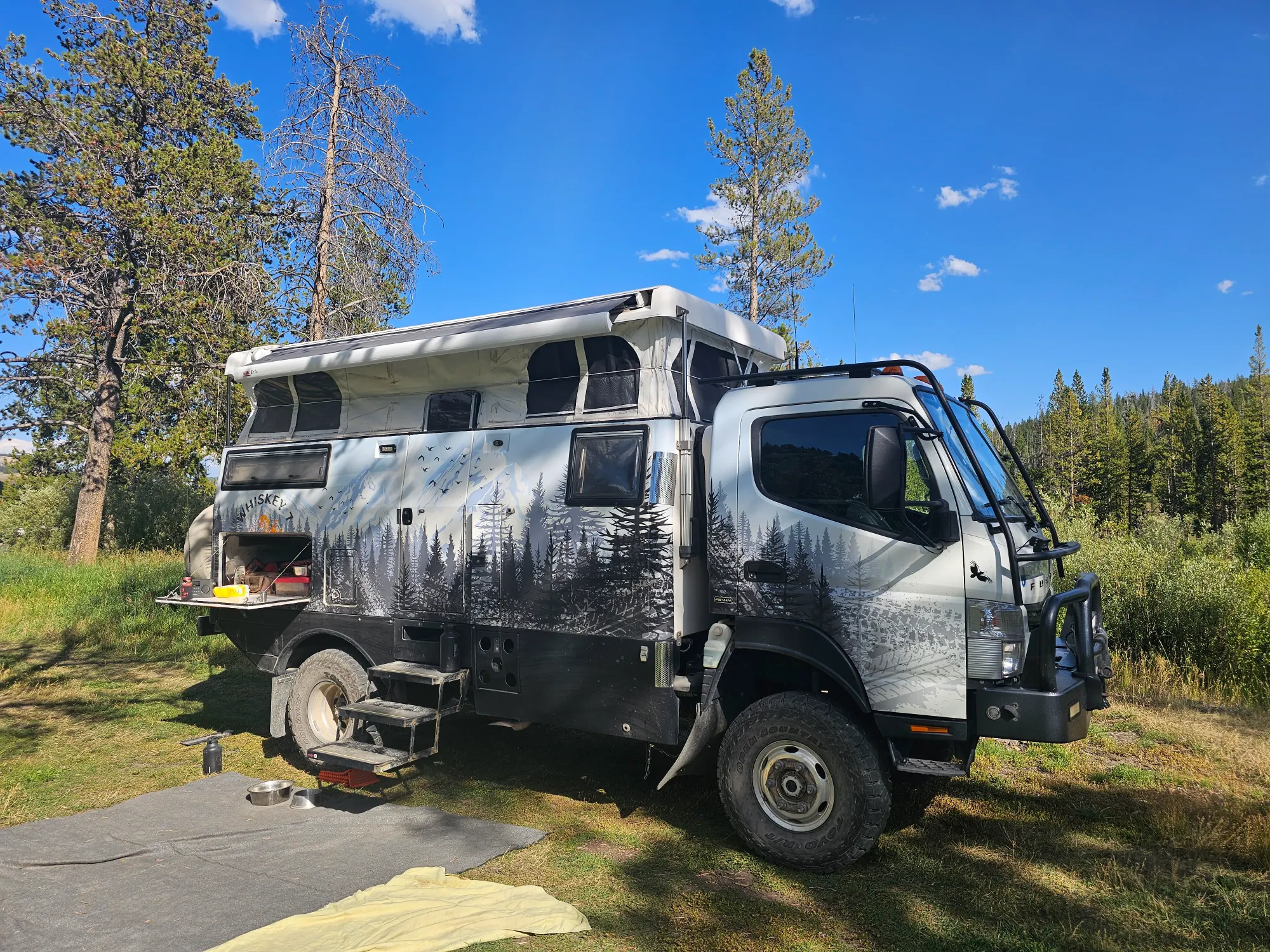
Environmental Benefits of Composting Toilets
When it comes to eco-friendly solutions for our camper, we've found that composting toilets are a game-changer. These innovative systems offer numerous environmental advantages that align perfectly with our commitment to sustainable camping.
Reduced Water Usage
One of the most significant benefits of using a composting toilet in our Earthcruiser is the dramatic reduction in water consumption. In the past, we have used a cassette toilet. These toilets require you to fill with water and they rinse the bowl after use. We found that on a 3-5 day trip, the water usage would average around 2-4 gallons. That doesn't sound like a lot of water, but every drop counts on the trail. In contrast, composting toilets use little to no water, which is a huge plus for conserving this precious resource. This water conservation aspect is particularly crucial when we're camping off-grid or in areas with limited water access.
Minimized Chemical Use
Another environmental benefit we've noticed is the reduced need for harsh chemicals. Unlike traditional RV and cassette toilets that often rely on chemical treatments to control odors and break down waste, composting toilets work naturally. They use a mixture of organic materials, such as sawdust or coconut coir, to facilitate the composting process. This approach not only eliminates the need for potentially harmful chemicals but also creates a more sustainable waste management system for our camper.
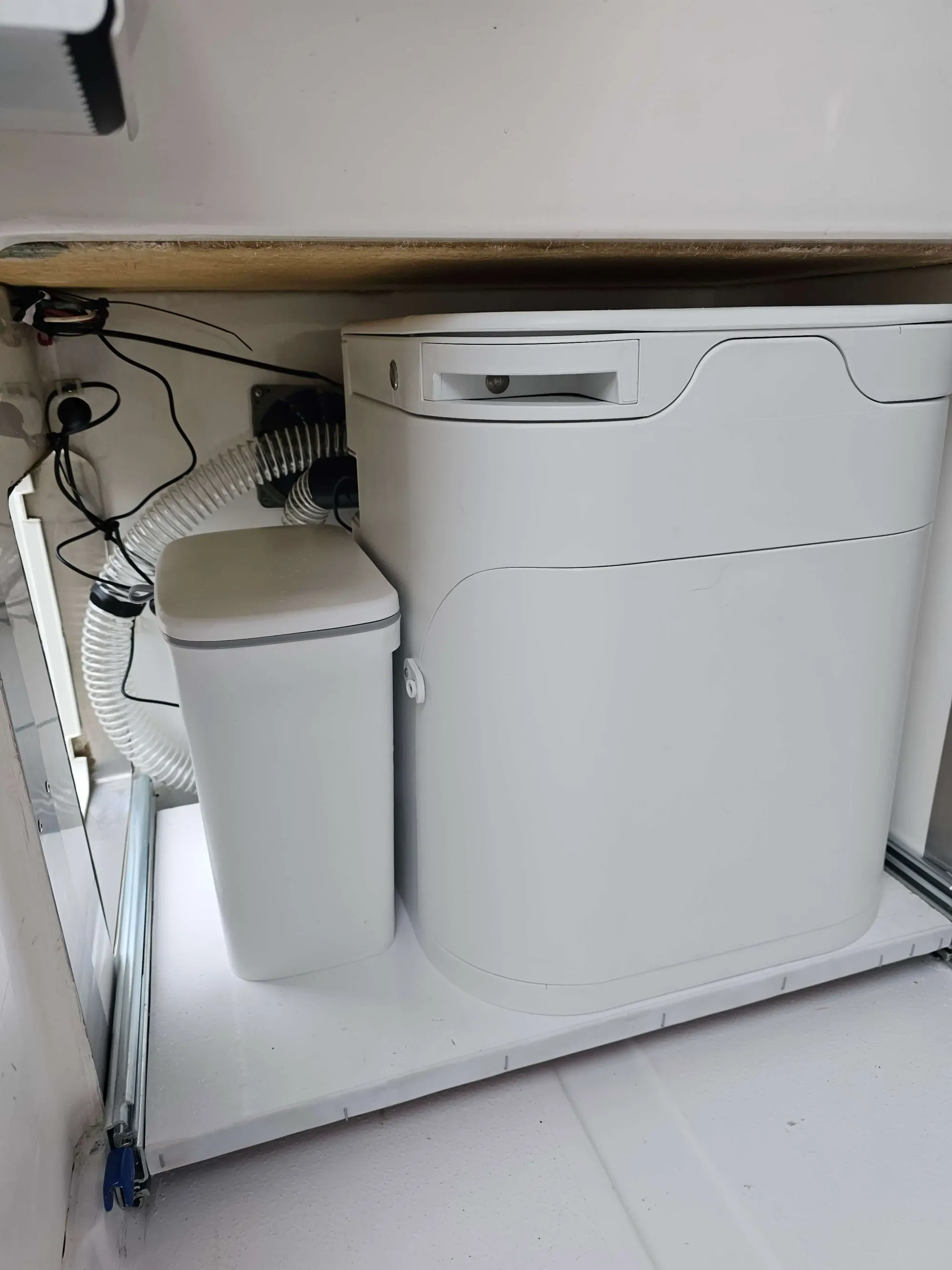
Nutrient Recycling
Perhaps the most exciting aspect of using a composting toilet in our camper is the opportunity to close the nutrient cycle. Instead of flushing away valuable nutrients, composting toilets allow us to recycle them back into the environment. The composting process transforms human waste into nutrient-rich soil, which can be used to support plant growth and improve soil quality. This natural recycling system reduces our reliance on synthetic fertilizers and helps minimize our environmental impact while camping.
Our old cassette toilet was five gallons. When out camping or overlanding, our process was to dump it when passing by a pit toilet. What most of us don't think about is what happens to that waste? Well, a pump truck has to come and pump it and take it to a waste treatment plant. With composting, not only do we not have to stop as much while out exploring but the labor and resources to process the waste are minimized.
In conclusion, the environmental benefits of using a composting toilet in our Earthcruiser are clear. From significant water savings to nutrient recycling and reduced chemical use, these systems offer a sustainable solution that enhances our camping experience while protecting the natural environments we love to explore.
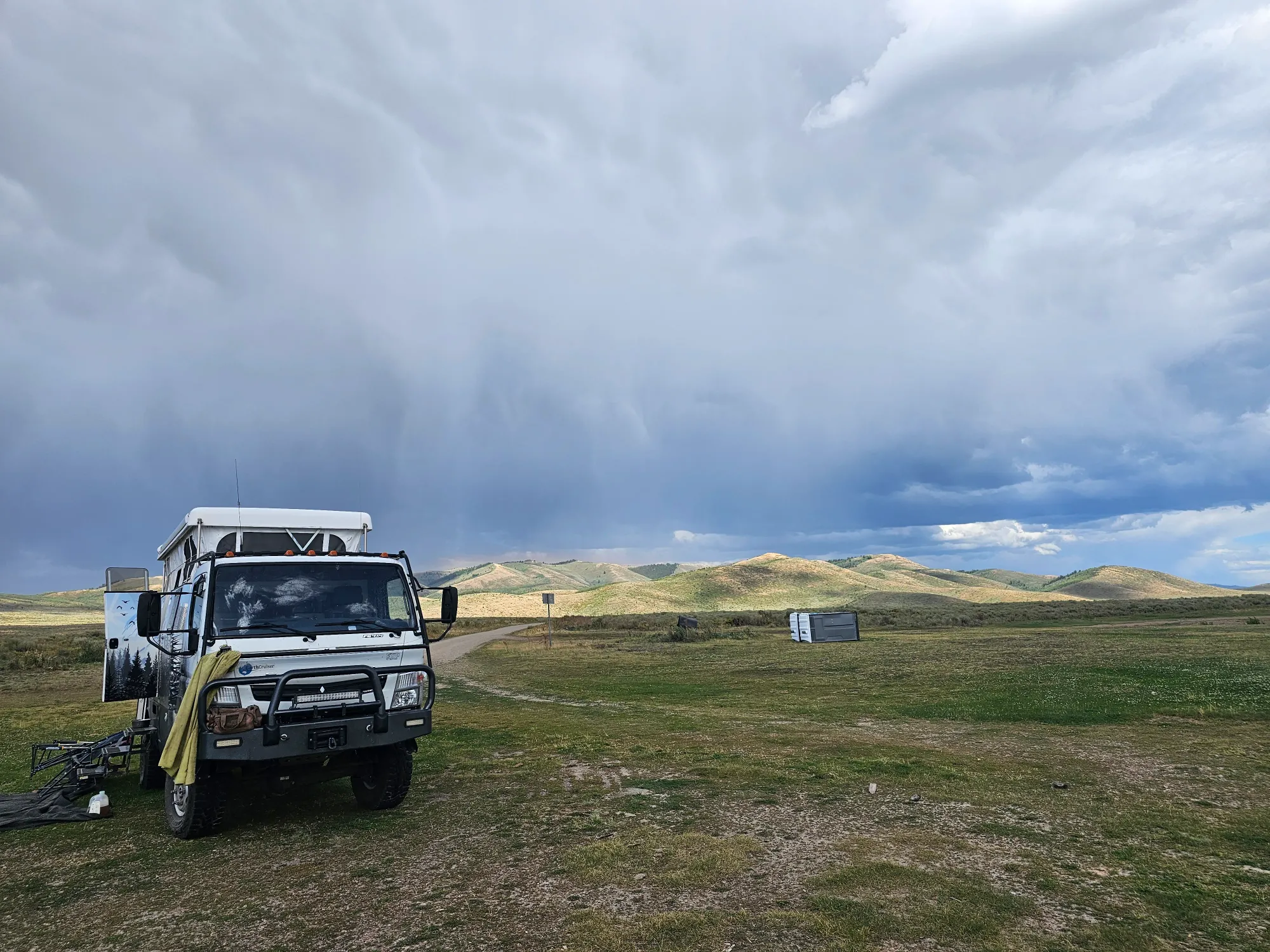
Space and Weight Savings in Your Camper
When it comes to maximizing space and reducing weight in our Earthcruiser, we've found that a composting toilet is a game-changer. This innovative solution has allowed us to make the most of our limited space while keeping our vehicle lightweight and efficient.
Elimination of Black Water Tank
While this doesn't pertain to us, one of the most significant advantages of upgrading to a composting toilet is the elimination of the black water tank. Traditional RV toilets require a bulky tank to store waste, which takes up valuable space and adds considerable weight to the vehicle. By switching to a composting toilet, most campers and overlanders will be able to remove this tank entirely, freeing up space for other essentials and reducing overall weight.
This change will also have an additional benefit – increased ground clearance. Without the low-hanging tank dump valves, a camper or overlanding rig will have better clearance, which is particularly useful when exploring off-road or navigating rough terrain.
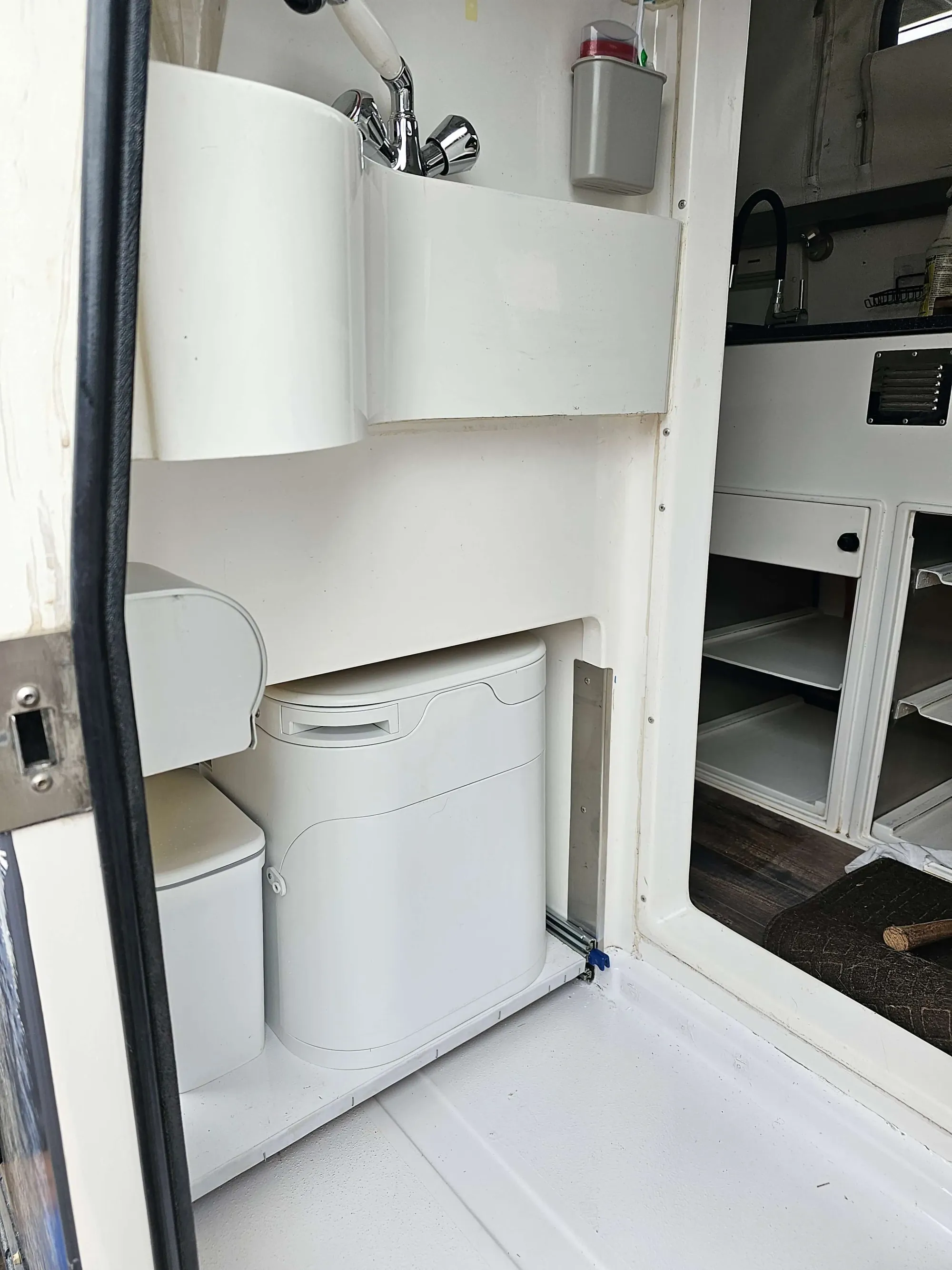
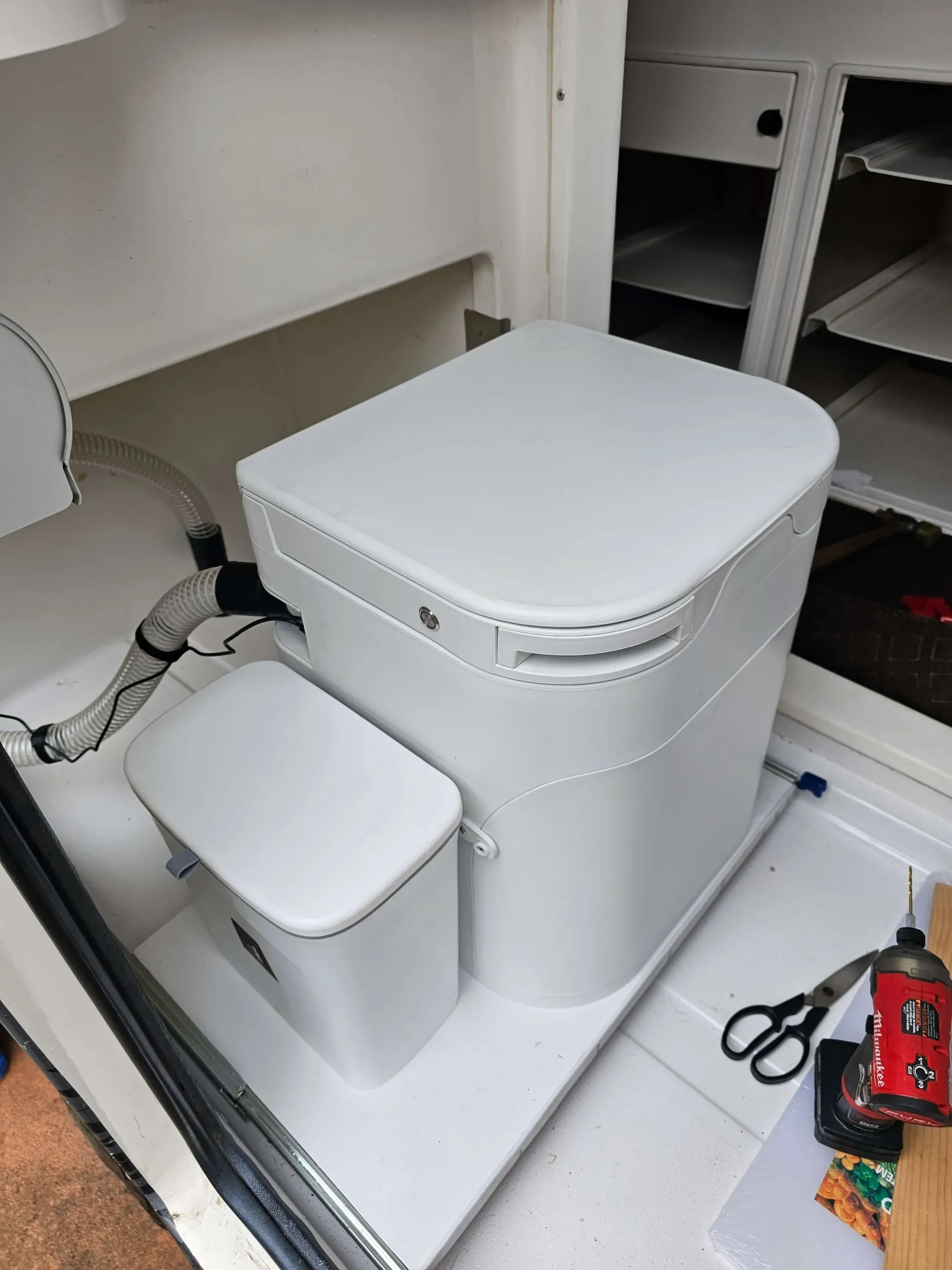
Compact Design
The compact design of composting toilets is another feature we've come to appreciate. These toilets are typically smaller than traditional RV toilets, which means they take up less floor space in our Earthcruiser. In the same space we had for our cassette toilet, we now have the toilet, a small storage area, and a garbage can. There are many manufacturers of composting toilets and most offer different sizes for specific needs.
We've found that the design of composting toilets is not only space-efficient but also user-friendly. Many models have separate compartments for liquid and solid waste, each with its own lid to lock in odors and prevent spillage. This separation also makes the disposal process much simpler and more hygienic.
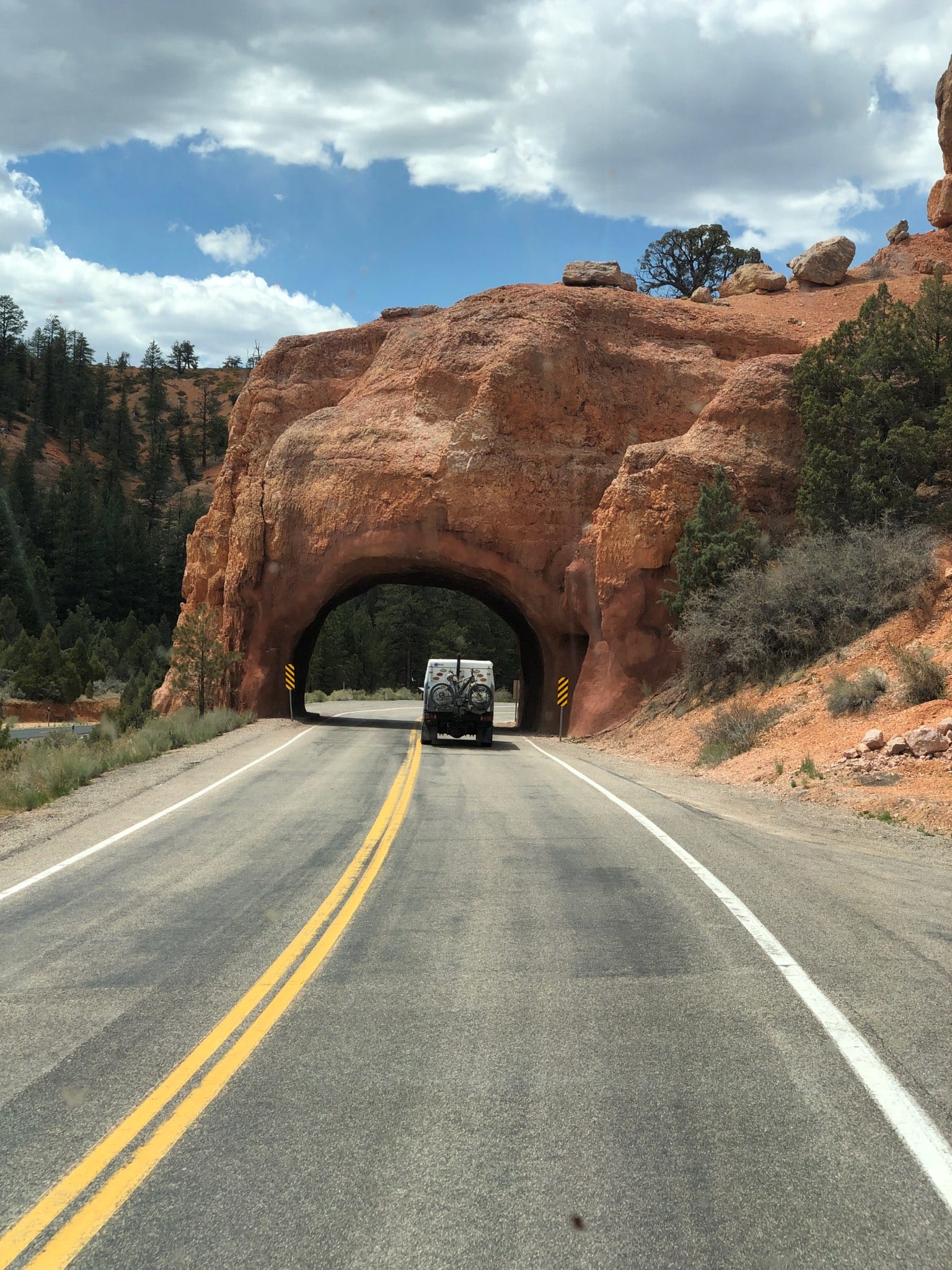
Increased Storage Options
By opting for a composting toilet, we've gained more flexibility in our storage options. The space used by our old cassette toilet has been repurposed for a small storage area. In a traditional RV, the space saved from removing the black water tank can be repurposed in various ways. Some RV owners choose to use this extra space to increase their fresh water or grey water capacity, which is particularly useful for extended off-grid camping trips.
In the Earthcruiser, we usually don't have a weight issue. But the weight savings from eliminating the black water tank and its contents can give campers and overlanders more flexibility in how they load their camper or rig.
Overall, the space and weight savings of a composting toilet can significantly enhance the camping experience. It allows overlanders to design their camper's interior more efficiently, carry more of what they need, and even improve a vehicle's performance. For anyone looking to maximize space and minimize weight in their camper, we highly recommend considering a composting toilet as a practical and effective solution.
Off-Grid Camping Freedom
When it comes to off-grid camping, we've found that a composting toilet for our camper has revolutionized our experience. This innovative solution has given us the freedom to explore remote locations without worrying about waste management facilities.

Extended Boondocking Capability
One of the most significant advantages we've discovered is the extended boondocking capability that a composting toilet provides. Traditional RV toilets rely on black water tanks that fill up quickly, limiting the duration of our off-grid stays. However, with a composting toilet, we've been able to extend our trips significantly. The OGO composting toilet, for example, can typically go a few weeks before needing to change the medium. (this is with 1-2 people using) Since it's a volume-based system, everyone's experience will be a little different. This extended capacity vs a cassette toilet 'means we can stay in beautiful, remote locations for longer periods without the need to find a dump station.
No Need for Dump Stations
Perhaps the most liberating aspect of using a composting toilet in our camper is the elimination of the need for dump stations. We no longer have to plan our routes around RV parks or campgrounds with waste disposal facilities. This freedom has allowed us to explore more off-the-beaten-path destinations and truly embrace the spirit of boondocking. The composting process naturally breaks down waste, making disposal much simpler and more environmentally friendly. We can simply empty the composted material into a trash bag or, if local regulations allow, use it as fertilizer.
In conclusion, the freedom provided by a composting toilet for our Earthcruiser has transformed our off-grid camping experiences. It's allowed us to extend our stays, explore more remote locations, and reduce our environmental impact. For anyone looking to embrace true off-grid freedom in their camper or RV, we highly recommend considering a composting toilet as an essential addition to your setup.
Odor Control and Hygiene Advantages
When it comes to composting toilets for campers, one of the most common concerns is odor control and hygiene. However, we've found that modern composting toilets are designed to effectively manage these issues, often outperforming traditional RV toilets in terms of smell and cleanliness.
Separation of Liquids and Solids
A key feature of composting toilets that contributes to odor control is the separation of liquids and solids. This design has a significant impact on reducing unpleasant smells. By keeping the solid waste dry, the composting process is more efficient, and odors are minimized. We've noticed that dry solids, along with the use of a covering material like sawdust or coconut coir, create an environment that's surprisingly odor-free.
The separation also makes maintenance easier. With liquids diverted to a separate container, the solid waste compartment remains drier, which not only reduces odors but also extends the time between emptying. This separation is crucial for the composting process and helps prevent the formation of sewage-like smells that can occur when liquids and solids mix.
Ventilation Systems
Another crucial aspect of odor control in composting toilets for campers is the ventilation system. Most models come equipped with a small fan that continuously moves air through the toilet and out of the camper. This airflow serves multiple purposes:
- It helps to evaporate excess moisture from the solid waste compartment.
- It aids in the composting process by providing oxygen to the beneficial bacteria.
- It effectively removes any potential odors before they can enter the living space.
We've found that these ventilation systems are remarkably efficient. In fact, when properly installed and maintained, a composting toilet can actually make your camper smell better than a traditional RV toilet. The fan typically uses minimal power, usually around 0.1 amps, making it a practical solution even for off-grid camping.
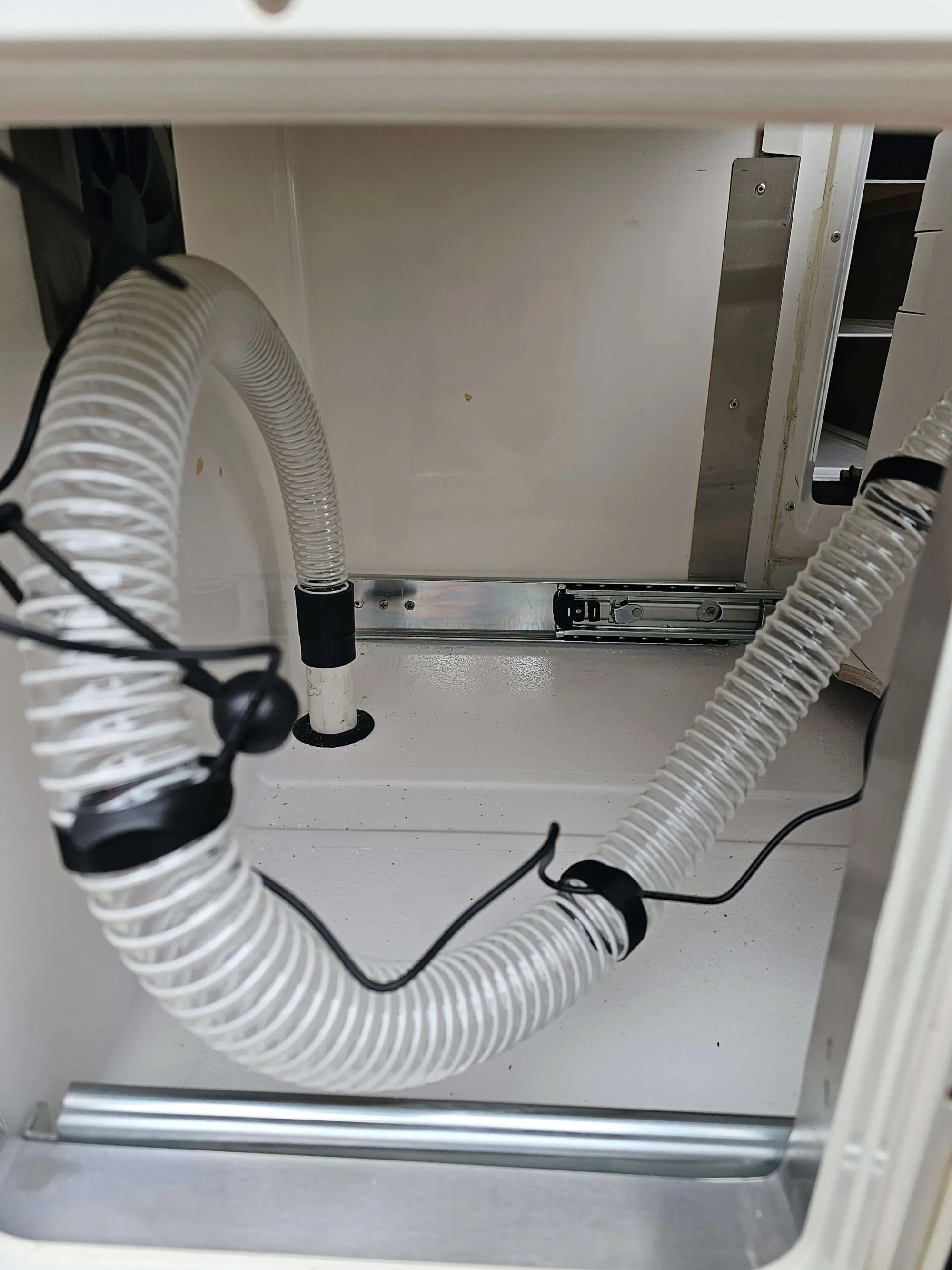
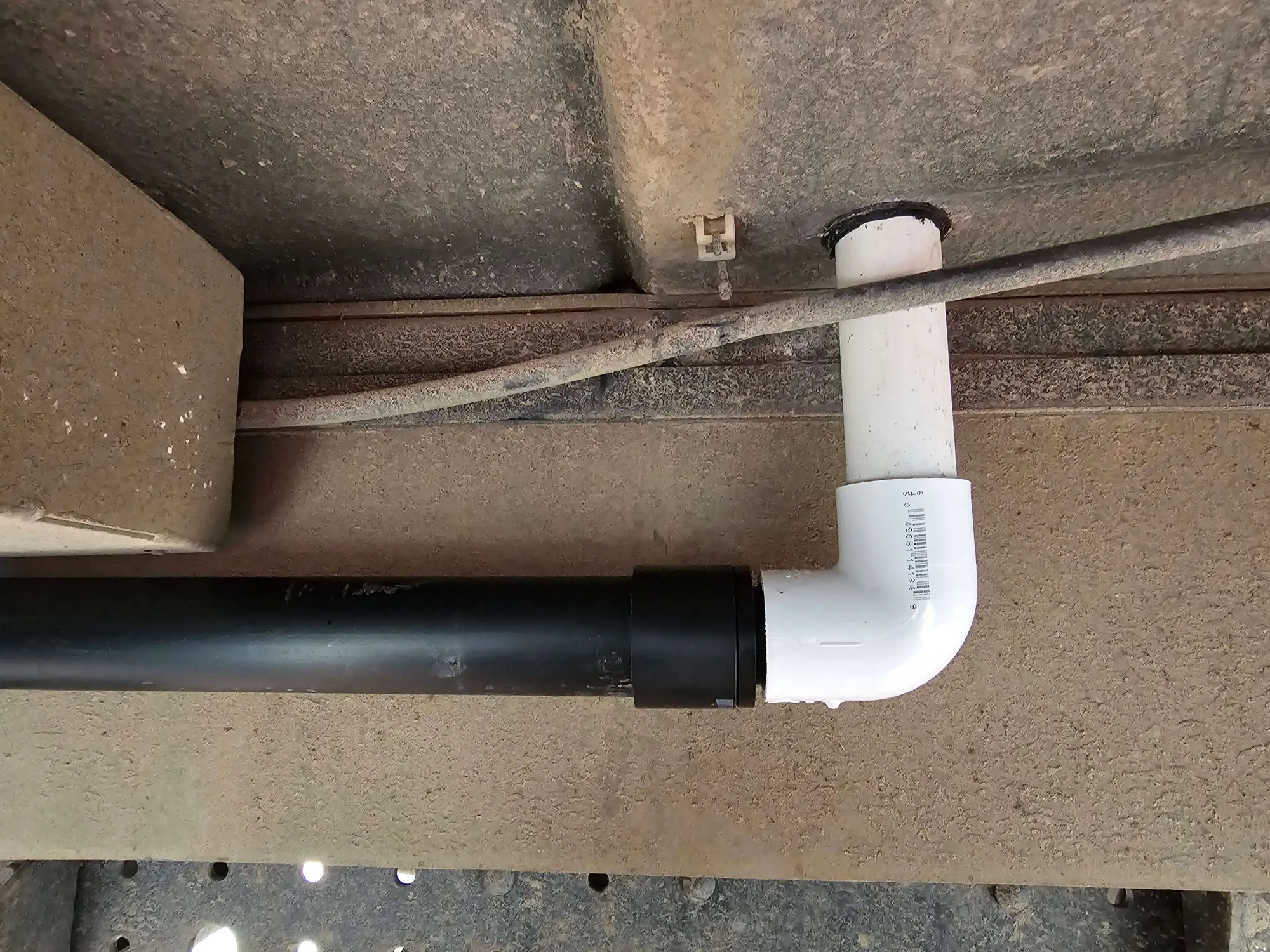
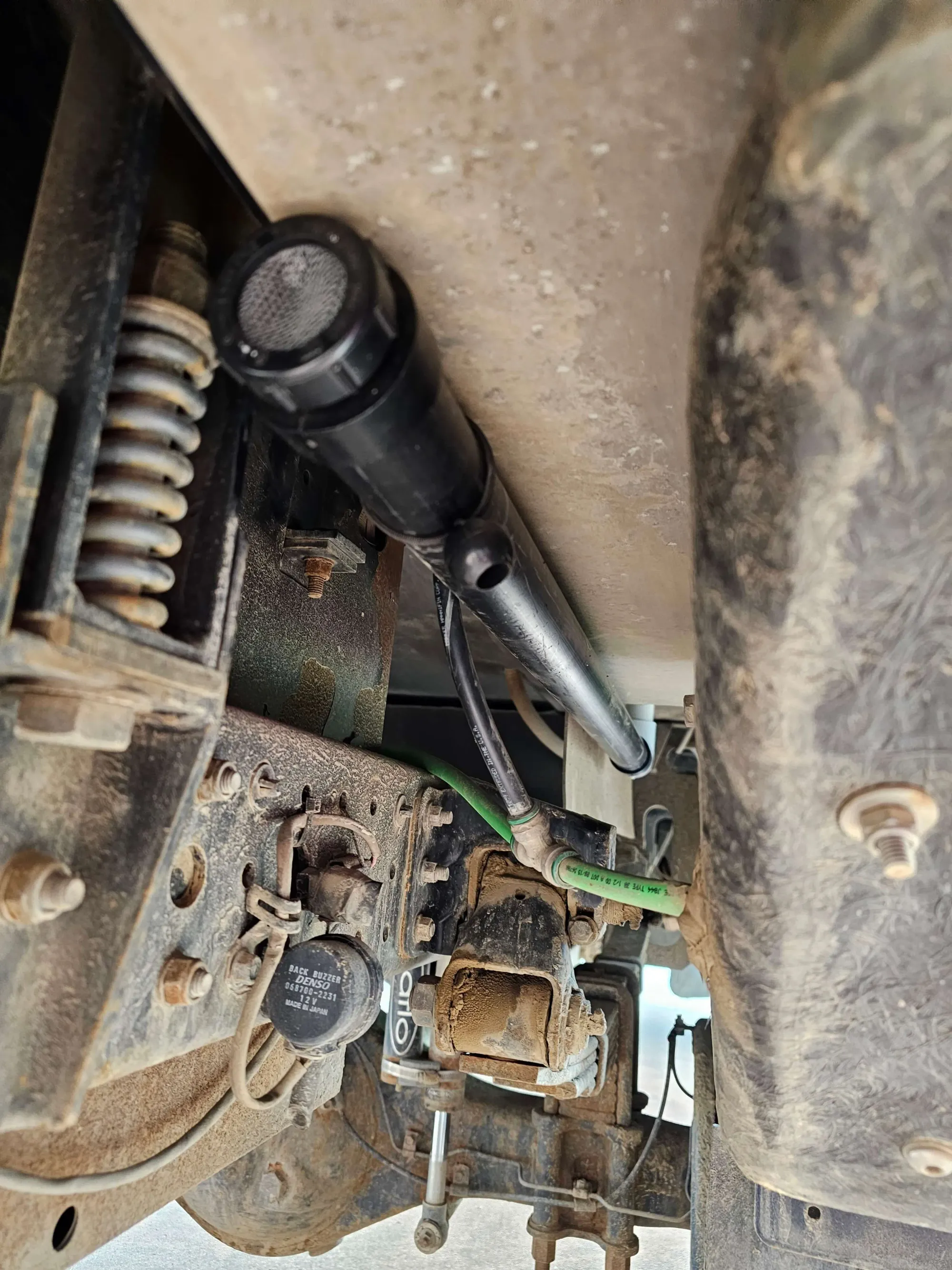
Easy Cleaning and Maintenance
Contrary to what you might expect, composting toilets for campers are surprisingly easy to clean and maintain. The separation of liquids and solids not only helps with odor control but also simplifies the cleaning process. We've discovered that regular maintenance is key to keeping the toilet hygienic and odor-free.
For cleaning the toilet bowl and seat, a simple spray of water and vinegar mixture usually suffices. It's important to avoid harsh chemicals or soaps, as these can disrupt the composting process. Some manufacturers recommend using enzyme-based cleaners that are specifically designed for composting toilets.
As for the solid waste compartment, it typically requires minimal cleaning. The composting process naturally breaks down the waste, and any residue left after emptying will continue to compost with the next use. The liquid container may need more frequent attention, but a simple rinse with vinegar can help control any odors.
In our experience, maintaining a composting toilet in our camper has been far less unpleasant than dealing with a traditional RV toilet. The absence of water and chemicals not only makes it more environmentally friendly but also contributes to a more hygienic and odor-free camping experience.
Conclusion
Thanks for supporting our blog and You Tube channel. Stay safe out there but keep exploring
Brent Conklin
https://frontrange.co/@whiskey7ranch
